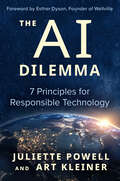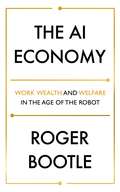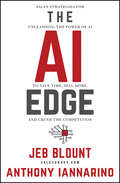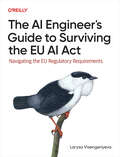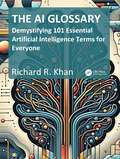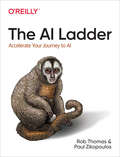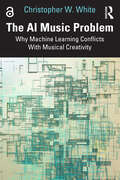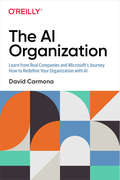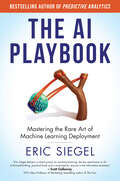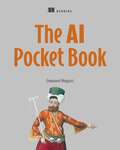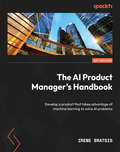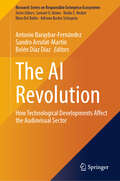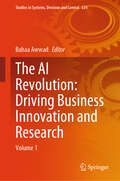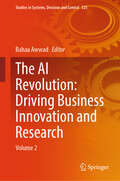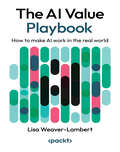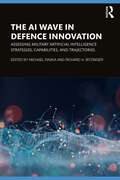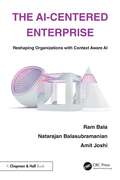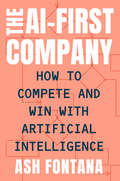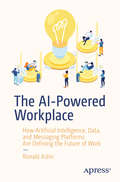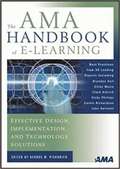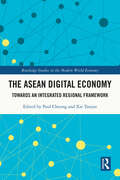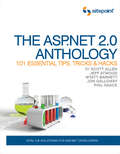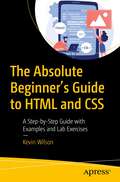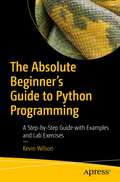- Table View
- List View
The AI Dilemma: 7 Principles for Responsible Technology
by Art Kleiner Juliette PowellThe misuse of AI has led to wrongful arrests, denial of medical care, even genocide-this book offers 7 powerful principles that business can use now to end the harm.AI holds incredible promise to improve virtually every aspect of our lives, but we can't ignore its risks, mishaps and misuses. Juliette Powell and Art Kleiner offer seven principles for ensuring that machine learning supports human flourishing. They draw on Powell's research at Columbia University and use a wealth of real-world examples. Four principles relate to AI systems themselves. Human risk must be rigorously determined and consciously included in any design process. AI systems must be understandable and transparent to any observer, not just the engineers working on them. People must be allowed to protect and manage their personal data. The biases embedded in AI must be confronted and reduced. The final three principles pertain to the organizations that create AI systems. There must be procedures in place to hold them accountable for negative consequences. Organizations need to be loosely structured so that problems in one area can be isolated and resolved before they spread and sabotage the whole system. Finally, there must be psychological safety and creative friction, so that anyone involved in software development can bring problems to light without fear of reprisal. Powell and Kleiner explore how to implement each principle, citing current best practices, promising new developments, and sobering cautionary tales. Incorporating the perspectives of engineers, businesspeople, government officials, and social activists, this book will help us realize the unprecedented benefits and opportunities AI systems can provide.
The AI Does Not Hate You: Superintelligence, Rationality and the Race to Save the World
by Tom Chivers'A fascinating and delightfully written book about some very smart people who may not, or may, be about to transform humanity forever' JON RONSONThis is a book about AI and AI risk. But it's also more importantly about a community of people who are trying to think rationally about intelligence, and the places that these thoughts are taking them, and what insight they can and can't give us about the future of the human race over the next few years. It explains why these people are worried, why they might be right, and why they might be wrong. It is a book about the cutting edge of our thinking on intelligence and rationality right now by the people who stay up all night worrying about it.Along the way, we discover why we probably don't need to worry about a future AI resurrecting a perfect copy of our minds and torturing us for not inventing it sooner, but we perhaps should be concerned about paperclips destroying life as we know it; how Mickey Mouse can teach us an important lesson about how to program AI; and how a more rational approach to life could be what saves us all.
The AI Economy: Work, Wealth and Welfare in the Robot Age
by Roger Bootle'A well-researched, enjoyable and thoughtful book'. - Calum Chace, ForbesExtraordinary innovations in technology promise to transform the world, but how realistic is the claim that AI will change our lives? In this much needed book the acclaimed economist Roger Bootle responds to the fascinating economic questions posed by the age of the robot, steering a path away from tech jargon and alarmism towards a rational explanation of the ways in which the AI revolution will affect us all. Tackling the implications of Artificial Intelligence on growth, productivity, inflation and the distribution of wealth and power, THE AI ECONOMY also examines coming changes to the the way we educate, work and spend our leisure time.A fundamentally optimistic view which will help you plan for changing times, this book explains AI and leads you towards a more certain future.
The AI Edge: Sales Strategies for Unleashing the Power of AI to Save Time, Sell More, and Crush the Competition (Jeb Blount)
by Jeb Blount Anthony IannarinoUpgrade your sales process by plugging into the new power of artificial intelligence In today's cutthroat sales world, where sales professionals are constantly juggling multiple responsibilities and navigating a sea of relentless competitors, everyone is looking for an edge. What if that EDGE is found in a tool powerful enough to give you more time in your sales day, accelerate your productivity, and still leave room for the human touch that's vital to building relationships? Enter the game-changing world of Artificial Intelligence. Enter The AI Edge. The AI Edge isn't just another book about technology. Anthony Iannarino and Jeb Blount, the world's most prolific sales book authors and trainers, have come together to transform how you navigate the sales process by helping you plug into artificial intelligence. This groundbreaking, hands-on guide marries their unparalleled sales strategies, used by millions of salespeople, with the transformative power of AI. Drawing from cutting-edge research and real-world applications, the authors demystify AI and demonstrate its potential to give you more time to leverage your human advantage—creativity, empathy, and authenticity—to build deeper relationships and winning solutions that give you a leg up over the competition. Inside you'll find: Expert Guidance: Benefit from the combined wisdom of Blount and Iannarino, two giants in the sales realm, as they lay out the roadmap to plugging into an AI-augmented sales strategy Streamlined Processes & Empowered Engagement: Discover AI's role in automating repetitive tasks, freeing you to fully lean into the uniquely human side of sales: cultivating relationships, unleashing creativity, and offering unparalleled authenticity Sales Prompt Engineering: Get hands-on with tailored prompts that allow you to tap into generative AI and get better results in less time Powerful Messaging: Learn how AI, used effectively, can help you develop and go to market with powerful messaging and presentations that connect with stakeholder needs and separate you from the crowded field Intelligent Insights: Grasp how AI can be leveraged to surface insights that give you instant authority, grab stakeholder attention, and lead to richer, more productive sales conversations Research: Leverage the power of AI to build target prospecting lists that open pipeline opportunities while reducing cold calling and rejection Navigating the world of AI might seem daunting, but with Iannarino and Blount at the helm, it's a journey of empowerment, innovation, and profound human connection. Embrace a future where technology and humanity come together and carve out your own AI Edge in sales.
The AI Engineer's Guide to Surviving the EU AI Act
by Larysa VisengeriyevaWith the introduction of the EU AI Act, companies employing AI systems face a new set of comprehensive and stringent regulations. Dr. Larysa Visengeriyeva offers a much-needed guide for navigating these unfamiliar regulatory waters to help you meet compliance challenges with confidence. From explaining the legislative framework to sharing strategies for implementing robust MLOps and data governance practices, this wide-ranging book shows you the way to thrive, not just survive, under the EU AI Act. It's an indispensable tool for engineers, data scientists, and policymakers engaged in or planning for AI deployments within the EU. By reading, you'll gain:An in-depth understanding of the EU AI Act, including the four risk categories and what they mean for youStrategies for compliance, including practical approaches to achieving technical readinessActionable advice on applying MLOps methodologies to ensure ongoing complianceInsights on the implications of the EU's pioneering approach to AI regulation and its global effects
The AI Glossary: Demystifying 101 Essential Artificial Intelligence Terms for Everyone
by Richard KhanEmbark on a journey of clarity and discovery with "THE AI GLOSSARY: Demystifying 101 Essential Artificial Intelligence Terms for Everyone." In a world increasingly powered by AI and ML, understanding these technologies is no longer a luxury but a necessity. This book stands as your guide through the complex terrain of artificial intelligence terms, transforming the intricate into the accessible.Crafted with precision and insight, each term is unraveled not just through definitions but through engaging narratives that connect deeply with real-world applications. From the foundational concepts of "Artificial Intelligence" and "Machine Learning" to the cutting-edge innovations of "ChatGPT" and "DALL-E," this glossary is designed to enlighten, inspire, and empower. Beyond mere explanations, it delves into the ethical considerations and interdisciplinary impacts of AI, making it a comprehensive resource for anyone looking to navigate this transformative field.Whether you're a student embarking on your studies, a professional seeking to broaden your horizon, or a curious mind eager to understand the technologies shaping our future, "THE AI GLOSSARY" is your indispensable companion. Let this book be your beacon, illuminating the path to a deeper understanding of the language of AI and ML, and inviting you to partake in the wonders of this revolutionary domain.
The AI Ladder: Accelerate Your Journey to AI
by Rob Thomas Paul ZikopoulosAI may be the greatest opportunity of our time, with the potential to add nearly $16 trillion to the global economy over the next decade. But so far, adoption has been much slower than anticipated, or so headlines may lead you to believe. With this practical guide, business leaders will discover where they are in their AI journey and learn the steps necessary to successfully scale AI throughout their organization.Authors Rob Thomas and Paul Zikopoulos from IBM introduce C-suite executives and business professionals to the AI Ladder—a unified, prescriptive approach to help them understand and accelerate the AI journey. Complete with real-world examples and real-life experiences, this book explores AI drivers, value, and opportunity, as well as the adoption challenges organizations face. Understand why you can’t have AI without an information architecture (IA)Appreciate how AI is as much a cultural change as it is a technological oneCollect data and make it simple and accessible, regardless of where it livesOrganize data to create a business-ready analytics foundationAnalyze data, and build and scale AI with trust and transparencyInfuse AI throughout your entire business and create intelligent workflows
The AI Music Problem: Why Machine Learning Conflicts With Musical Creativity
by Christopher W. WhiteMusic poses unique and complex challenges for artificial intelligence, even as 21st-century AI grows ever more adept at generating compelling content. The AI Music Problem: Why Machine Learning Conflicts With Musical Creativity probes the challenges behind AI-generated music, with an investigation that straddles the technical, the musical, and the aesthetic. Bringing together the perspectives of the humanities and computer science, the author shows how the difficulties that music poses for AI connect to larger questions about music, artistic expression, and the increasing ubiquity of artificial intelligence. Taking a wide view of the current landscape of machine learning and Large Language Models, The AI Music Problem offers a resource for students, researchers, and the public to understand the broader issues surrounding musical AI on both technical and artistic levels. The author breaks down music theory and computer science concepts with clear and accessible explanations, synthesizing the technical with more holistic and human-centric analyses. Enabling readers of all backgrounds to understand how contemporary AI models work and why music is often a mismatch for those processes, this book is relevant to all those engaging with the intersection between AI and musical creativity today.
The AI Organization: Learn from Real Companies and Microsoft’s Journey How to Redefine Your Organization with AI
by David CarmonaMuch in the same way that software transformed business in the past two decades, AI is set to redefine organizations and entire industries. Just as every company is a software company today, every company will soon be an AI company.This practical guide explains how business and technical leaders can embrace this new breed of organization. Based on real customer experience, Microsoft’s David Carmona covers the journey necessary to become an AI Organization—from applying AI in your business today to the deep transformation that can empower your organization to redefine the industry.You'll learn the core concepts of AI as they are applied to real business, explore and prioritize the most appropriate use cases for AI in your company, and drive the organizational and cultural change needed to transform your business with AI.
The AI Playbook: Mastering the Rare Art of Machine Learning Deployment (Management on the Cutting Edge)
by Eric SiegelIn his bestselling first book, Eric Siegel explained how machine learning works. Now, in The AI Playbook, he shows how to capitalize on it.&“Eric Siegel delivers a robust primer on machine learning, the key mechanism in AI. A forward-looking, practical book and a must-read for anyone in the information economy.&” —Scott Galloway, NYU Stern Professor of Marketing; bestselling author of The Four &“An antidote to today&’s relentless AI hype—why some AI initiatives thrive while others fail and what it takes for companies and people to succeed.&”—Charles Duhigg, author of bestsellers The Power of Habit and Smarter Faster BetterThe greatest tool is the hardest to use. Machine learning is the world&’s most important general-purpose technology—but it&’s notoriously difficult to launch. Outside Big Tech and a handful of other leading companies, machine learning initiatives routinely fail to deploy, never realizing value. What&’s missing? A specialized business practice suitable for wide adoption. In The AI Playbook, bestselling author Eric Siegel presents the gold-standard, six-step practice for ushering machine learning projects from conception to deployment. He illustrates the practice with stories of success and of failure, including revealing case studies from UPS, FICO, and prominent dot-coms. This disciplined approach serves both sides: It empowers business professionals, and it establishes a sorely needed strategic framework for data professionals. Beyond detailing the practice, this book also upskills business professionals—painlessly. It delivers a vital yet friendly dose of semi-technical background knowledge that all stakeholders need to lead or participate in machine learning projects, end to end. This puts business and data professionals on the same page so that they can collaborate deeply, jointly establishing precisely what machine learning is called upon to predict, how well it predicts, and how its predictions are acted upon to improve operations. These essentials make or break each initiative—getting them right paves the way for machine learning&’s value-driven deployment.What kind of AI does this book cover? The buzzword AI can mean many things, but this book is about machine learning, which is a central basis for—and what many mean by—AI. To be specific, this book covers the most vital use cases of machine learning, those designed to improve a wide range of business operations.
The AI Pocketbook
by Emmanuel MaggioriEverything you need to know about AI to survive—and thrive—as an engineer.If you&’re worried about your tech career going obsolete in a world of super-powered AI, never fear. The AI Pocket Book crams everything engineers need to know about AI into one short volume you can fit into your pocket. You&’ll build a better understanding of AI (and its limitations), learn how to use it more effectively, and future-proof your job against its advancement. In The AI Pocket Book you&’ll find no-nonsense advice on: • Deciphering AI jargon (there&’s lots of it!) • Where AI fits within your field of engineering • Why AI hallucinates—and what to do about it • What to do when AI comes for your job • The dark side of AI—copyright, snake oil, and replacing humans • Balancing skepticism with unrealistic expectations The AI Pocket Book gives you Emmanuel Maggiori&’s unvarnished and opinionated take on where AI can be useful, and where it still kind of sucks. Whatever your tech field, this short-and-sweet guide delivers the facts and techniques you&’ll need in the workplace of the present. About the technology You don&’t have to know everything about AI to get a big payoff! Whether you&’re looking to boost your coding speed, generate ideas for your next project, or just get a helping hand with your next Medium article, there&’s an AI-powered tool ready to assist. This fit-in-your pocket guide tells you everything you need to surf the AI wave instead of drowning in it. About the book The AI Pocket Book takes a peek inside the AI black box and gives you just enough on key topics like transformers, hallucinations, and the modern ecosystem of AI models and tools. You&’ll get handy techniques to select AI tools, learn when putting AI first is the smart move, and pick up some excellent tips for managing the inevitable, potentially expensive, screw ups. What's inside • Deciphering AI jargon (there&’s lots of it!) • Evaluating AI tools • Why AI hallucinates and what to do about it • How and when to use AI About the reader For engineers in all fields, from software to security. About the author Emmanuel Maggiori, PhD, is a software engineer and 10-year AI industry insider. He is also the author of Smart Until It&’s Dumb and Siliconned. Table of Contents 1 How AI works 2 Hallucinations 3 Selecting and evaluating AI tools 4 When to use (and not to use) AI 5 How AI will affect jobs and how to stay ahead 6 The fine print A Catalog of generative AI tools
The AI Product Manager's Handbook: Develop a product that takes advantage of machine learning to solve AI problems
by Irene BratsisMaster the skills required to become an AI product manager and drive the successful development and deployment of AI products to deliver value to your organization.Purchase of the print or Kindle book includes a free PDF eBook.Key FeaturesBuild products that leverage AI for the common good and commercial successTake macro data and use it to show your customers you're a source of truthBest practices and common pitfalls that impact companies while developing AI productBook DescriptionProduct managers working with artificial intelligence will be able to put their knowledge to work with this practical guide to applied AI. This book covers everything you need to know to drive product development and growth in the AI industry. From understanding AI and machine learning to developing and launching AI products, it provides the strategies, techniques, and tools you need to succeed.The first part of the book focuses on establishing a foundation of the concepts most relevant to maintaining AI pipelines. The next part focuses on building an AI-native product, and the final part guides you in integrating AI into existing products.You'll learn about the types of AI, how to integrate AI into a product or business, and the infrastructure to support the exhaustive and ambitious endeavor of creating AI products or integrating AI into existing products. You'll gain practical knowledge of managing AI product development processes, evaluating and optimizing AI models, and navigating complex ethical and legal considerations associated with AI products. With the help of real-world examples and case studies, you'll stay ahead of the curve in the rapidly evolving field of AI and ML.By the end of this book, you'll have understood how to navigate the world of AI from a product perspective.What you will learnBuild AI products for the future using minimal resourcesIdentify opportunities where AI can be leveraged to meet business needsCollaborate with cross-functional teams to develop and deploy AI productsAnalyze the benefits and costs of developing products using ML and DLExplore the role of ethics and responsibility in dealing with sensitive dataUnderstand performance and efficacy across verticalsWho this book is forThis book is for product managers and other professionals interested in incorporating AI into their products. Foundational knowledge of AI is expected. If you understand the importance of AI as the rising fourth industrial revolution, this book will help you surf the tidal wave of digital transformation and change across industries.
The AI Revolution: How Technological Developments Affect the Audiovisual Sector (Research Series on Responsible Enterprise Ecosystems)
by Belén Díaz Díaz Antonio Baraybar-Fernández Sandro Arrufat-MartínThis book presents an overview of the vast landscape of artificial intelligence (AI) in the media industry, more specifically in the audiovisual sector.Readers are guided through the fundamental pillars of AI, from machine learning algorithms to advanced neural networks, revealing the technological foundations that drive innovation in the field of communication and media. The possibilities of AI in this area are explored and discussed with real case studies. The book highlights not only the technological developments, but also the ethical dilemmas that arise. From privacy issues to equity in access to education, the book provides a comprehensive view of the challenges that must be addressed to ensure the ethical and sustainable development of artificial intelligence. Altogether, this book illuminates how AI continues to transform the way we communicate, learn, and relate to technology.
The AI Revolution: Volume 1 (Studies in Systems, Decision and Control #524)
by Bahaa AwwadThis comprehensive book explores the transformative role of artificial intelligence (AI) in business innovation and research. It provides a solid foundation in AI technologies, such as machine learning, natural language processing, and computer vision, and examines how they reshape business models and revolutionize industries. The book highlights the strategic implications of AI in enhancing customer experience, optimizing operations, and enabling data-driven decision-making. It explores the integration of AI with emerging trends like IoT, blockchain, and cloud computing for innovation. The role of AI in advancing scientific discovery and academic research is also explored, addressing challenges and opportunities in AI-driven methodologies. Organizational and ethical dimensions of AI implementation are considered, including talent acquisition, skills development, and data governance. Real-world case studies showcase AI's transformative power across diverse industries. This forward-thinking guide equips academics, researchers, and business leaders with knowledge and insights to harness the potential of AI and contribute to innovation and research.
The AI Revolution: Volume 2 (Studies in Systems, Decision and Control #525)
by Bahaa AwwadThis comprehensive book explores the transformative role of artificial intelligence (AI) in business innovation and research. It provides a solid foundation in AI technologies, such as machine learning, natural language processing, and computer vision, and examines how they reshape business models and revolutionize industries. The book highlights the strategic implications of AI in enhancing customer experience, optimizing operations, and enabling data-driven decision-making. It explores the integration of AI with emerging trends like IoT, blockchain, and cloud computing for innovation. The role of AI in advancing scientific discovery and academic research is also explored, addressing challenges and opportunities in AI-driven methodologies. Organizational and ethical dimensions of AI implementation are considered, including talent acquisition, skills development, and data governance. Real-world case studies showcase AI's transformative power across diverse industries. This forward-thinking guide equips academics, researchers, and business leaders with knowledge and insights to harness the potential of AI and contribute to innovation and research.
The AI Value Playbook: How to make AI work in the real world
by Lisa Weaver-LambertLearn from real-world examples how leveraging AI, including machine learning and generative AI, is imperative for businesses to navigate risk, drive value, and gain a competitive advantageKey FeaturesUnderstand machine learning and generative AI terminology, concepts, and the AI technology stack.Learn from diverse real-world case studies narrated by business leaders in their own voice. Apply a value-driven approach to AI applications across multiple business sectors.Book DescriptionBusiness leaders are challenged by the speed of AI innovation and how to navigate disruption and uncertainty. This book is a crucial resource for those who want to understand how to leverage AI to drive business value, drawn from the firsthand experience of those who have been implementing this technology successfully. The AI Value Playbook focuses on questions frequently posed by leaders and boards. How can businesses adapt to these emerging technologies? How can they start building and deploying AI as a strategic asset to drive efficiency? What risks or threats need to be considered? How quickly can value be created? This book is a response to those demands. In a series of in-depth and wide-ranging conversations with practitioners, from CEOs leading new generative AI-based companies to Data Scientists and CFOs working in more traditional companies. Our experts share their hard-earned wisdom, talking candidly about their successes and failures, and what excites them about the future. These interviews offer unique insights for business leaders to apply to their own organizations. The book distils a value-driven playbook for how AI can be put to work today.What you will learnFundamentals of AI concepts and the tech stackHow AI works with real-world practical applicationsHow to integrate into your company's overall strategyHow to incorporate generative AI in your processesHow to drive value with sector-wide examplesHow to organize an AI-driven operating modelHow to use AI for competitive advantageThe dos and don'ts of AI applicationWho this book is forThe AI Value Playbook is aimed at supporting non-technical executives and board members to quickly formulate a perspective on how to integrate AI. This book addresses the gap in data and AI knowledge in leadership teams that have an appetite for nuanced, targeted and practical solutions. It includes which levers and processes to consider to future-proof their business. It speaks to an audience interested in understanding how AI can drive value for their organisations.
The AI Wave in Defence Innovation: Assessing Military Artificial Intelligence Strategies, Capabilities, and Trajectories
by Michael RaskaAn international and interdisciplinary perspective on the adoption and governance of artificial intelligence (AI) and machine learning (ML) in defence and military innovation by major and middle powers. Advancements in AI and ML pose pressing questions related to evolving conceptions of military power, compliance with international humanitarian law, peace promotion, strategic stability, arms control, future operational environments, and technology races. To navigate the breadth of this AI and international security agenda, the contributors to this book include experts on AI, technology governance, and defence innovation to assess military AI strategic perspectives from major and middle AI powers alike. These include views of how the United States, China, Japan, South Korea, the European Union, and Russia see AI/ML as a technology with the potential to reshape military affairs and power structures in the broader international system. This diverse set of views aims to help elucidate key similarities and differences between AI powers in the evolving strategic context. A valuable read for scholars of security studies, public policy, and STS studies with an interest in the impacts of AI and ML technologies.
The AI-Centered Enterprise: Reshaping Organizations with Context Aware AI
by Amit Joshi Ram Bala Natarajan BalasubramanianThe explosion of generative AI has sparked a wave of case studies showing how quickly and profoundly it is transforming businesses. Yet most of these use cases still apply the technology to enhancing existing systems. This book makes the case for why business leaders must revisit the fundamentals of generative AI and look beyond short-term, tactical gains. Tools like ChatGPT mark just the beginning of Context Aware AI—systems that grasp both the content and intent of unstructured human input. Drawing on real-world examples and academic research, we demonstrate how Context Aware AI can enhance organizational interactions, unlock new forms of collaboration, and usher in the era of the AI-Centered Enterprise. By augmenting baseline Large Language Models (LLMs) with techniques like prompt engineering, retrieval-augmented generation (RAG), knowledge graphs, and notably agentic systems, organizations can build customized tools that adapt to individual users’ thinking patterns and the collaborative workflows they are a part of. We present a practical framework—the 3Cs: Calibrate, Clarify, Channelize, to help leaders navigate this radical shift across multiple levels of organizations.
The AI-First Company: How to Compete and Win with Artificial Intelligence
by Ash FontanaArtificial Intelligence is transforming every industry, but if you want to win with AI, you have to put it first on your priority list.AI-First companies are the only trillion-dollar companies, and soon they will dominate even more industries, more definitively than ever before. These companies succeed by design--they collect valuable data from day one and use it to train predictive models that automate core functions. As a result, they learn faster and outpace the competition in the process. Thankfully, you don't need a Ph.D. to learn how to win with AI. In The AI-First Company, internationally-renowned startup investor Ash Fontana offers an executable guide for applying AI to business problems. It's a playbook made for real companies, with real budgets, that need strategies and tactics to effectively implement AI. Whether you're a new online retailer or a Fortune 500 company, Fontana will teach you how to: • Identify the most valuable data; • Build the teams that build AI; • Integrate AI with existing processes and keep it in check; • Measure and communicate its effectiveness; • Reinvest the profits from automation to compound competitive advantage.If the last fifty years were about getting AI to work in the lab, the next fifty years will be about getting AI to work for people, businesses, and society. It's not about building the right software -- it's about building the right AI. The AI-First Company is your guide to winning with artificial intelligence.
The AI-Powered Workplace: How Artificial Intelligence, Data, and Messaging Platforms Are Defining the Future of Work
by Ronald AshriWe are entering the next wave of digital transformation. Artificial intelligence has an ever-increasing significance in our daily lives, and there is no difference when it comes to our workplaces. It is up to you to choose how to utilize these new tools to sharpen your organization’s competitive advantage, improve your team’s well-being, and help your business thrive. In The AI-Powered Workplace, author Ronald Ashri provides a map of the digital landscape to guide you on this timely journey. You’ll understand how the combination of AI, data, and conversational collaboration platforms—such as Slack, Microsoft Teams, and Facebook Workplace—is leading us to a radical shift in how we communicate and solve problems in the modern workplace. Our ability to automate decision-making processes through the application of AI techniques and through modern collaboration tools is a game-changer. Ashri skillfully presents his industry expertise and captivating insights so you have a thorough understanding of how to best combine these technologies with execution strategies that are optimized to your specific needs. The AI-Powered Workplace is an essential technical, cultural, and business handbook that arms you with clear steps to redefine and improve how you get work done. Software is now a proactive workplace partner revolutionizing all aspects of our professional lives from how we collaborate in the digital sphere to the literal physical environments in which we operate our business. This book not only ensures that you do not get left behind, but that you are consistently light years ahead of the pack.What You'll LearnLearn how the introduction of AI-powered applications in the workplace replaces or augments our capabilities and enables activities that were not possible beforeRealize how the combination of AI, data, and messaging platforms (Slack, Microsoft Teams, Skype, WhatsApp) leads to a radical shift in how we communicate, collaborate, and solve problemsDevelop strategies for the digital transformation of organizations through the use of AI-powered applications (from simple chatbots to more complex conversational applications) that operate within messaging environments we use to collaborate with our colleagues dailyKnow the dangers and ethical questions that the introduction of these technologies can cause in the workplace Who This Book is ForProfessionals at all levels interested in learning how AI, conversational platforms, and data can change organizations, including but not limited to team leaders, managers, and CxOs
The AMA Handbook of E-Learning: Effective Design, Implementation, And Technology Solutions
by George M. PiskurichThis authoritative sourcebook is a timely decision-making tool for companies making the transition to (or already using) e-learning. Featuring all-original contributions from high-profile practitioners and renowned theorists, the book reveals how top companies are implementing and using this crucial employee development tool. Topics include: * analyzing organizational need * selling e-learning to the organization * learning management systems * synchronous collaboration * learning portals * repurposing materials * outsourcing and vendor relations. Other chapters focus on motivation and retention, technological and software options, measuring ROI, and more.
The ASEAN Digital Economy: Towards an Integrated Regional Framework (Routledge Studies in the Modern World Economy)
by Paul Cheung Xie TaojunBoasting the fastest growing Internet market in the world, Association of Southeast Asian Nations (ASEAN) is accelerating into the digital economy. This book assesses the potential economic impact of digital economy agreements (DEAs) and the readiness of some ASEAN member states to grow the digital economy in collaboration. The book presents a novel framework to assess countries’ readiness to enter digital economy collaborations, following the architecture of Singapore’s DEAs with its trading partners. It takes a bird’s-eye view of the digital economy in ASEAN and reviews the current state of digital infrastructure and regulations. The book also includes simulation exercises to project economic outcomes delivered by regional collaborations. It also elaborates on the specific strengths and weaknesses of five ASEAN member states. These ASEAN member states include Indonesia, Malaysia, the Philippines, Vietnam, and Cambodia. The book concludes by revisiting the ASEAN economy as a whole. It points out key issues country leaders need to work on as they proceed with digital economy collaborations. This book is written for scholars, policymakers, and industrial practitioners who wish to learn the latest developments in the ASEAN digital economy.
The ASP.NET 2.0 Anthology: 101 Essential Tips, Tricks & Hacks
by Jon Galloway Phil Haack Wyatt Barnett Scott Allen Jeff AtwoodAn ASP.NET 2.0 book that just helps you get things done!This book contains a collection of 101 best practice, object oriented solutions that you can easily adapt to your own projects.Coverage includes:Working with text, numbers, dates & timesAccessing data with ADO.NETForm validation under multiple sceneriosPage, Session and application state tipsAccess control in web applicationsProducing standards compliant outputEnhancing applications with AJAXWorking with EmailHandling errors and debuggingPerformance tips and pitfallsAnd much more!As a bonus, all book buyers get download access to the code archive which has all the examples in the book in both C# and VB.Back Cover"A comprehensive collection of ready-to-use ASP.NET solutions!"The ASP.NET 2.0 Anthology: 101 Essential Tips, Tricks & Hacks is a collection of solutions to the most common ASP.NET problems. Let five world-class ASP.NET professionals guide you through countless practical solutions using C# or VB.Learn to:Add interactivity with Ajax and JavaScript.Build a database access layer for improved portability.Sidestep the ASP.NET framework when required.Build data-driven applications quickly with SubSonic.Gracefull handle errors effectively.Work with email: send, parse, & manage attachments.Use component-based development for flexibility.Make your applications search engine friendly.Validate data input on forms.Create a user registration system.Use Master Pages to simplify development.Work with binary content.Improve the speed of your site, decrease bandwidth usage and speed up database queriesAnd lots more...
The Absolute Beginner's Guide to HTML and CSS: A Step-by-Step Guide with Examples and Lab Exercises
by Kevin WilsonWritten as an illustrated, step-by-step guide for beginners, this book will introduce you to HTML and CSS with lab exercises and examples of code. You'll begin by setting up the development environment such as local web server and html editor. The next few chapters cover web servers, the basics of HTML such as language syntax, tags, and how to write a program. Next, you'll learn how to put together simple web pages demonstrating how the code works and how to use various HTML tags and CSS to style the pages. Finally, the use of CMS to build websites such as Drupal and WordPress and how HTML and CSS fits in. At the end there are reference libraries for both HTML tags and CSS. The Absolute Beginners Guide to HTML and CSS provides you with the tools, confidence, and inspiration to start building web pages and websites. If you are a programmer, developer or a student, or just someone who wants to learn on their own, this book is for you.What You'll LearnUnderstand basic computer programming conceptsSee how to use HTML and CSS to build web pagesApply the syntax of HTML and CSSSee how HTML and CSS fits into CMS systems such as Drupal and WordPressWho This Book Is For Software programmers, developers, students, and anyone who wants a quick reference for HTML and CSS
The Absolute Beginner's Guide to Python Programming: A Step-by-Step Guide with Examples and Lab Exercises
by Kevin WilsonWritten as an illustrated, step-by-step guide, this book will introduce you to Python with examples using the latest version of the language. You'll begin by learning to set up your Python environment. The next few chapters cover the basics of Python such as language classifications, Python language syntax, and how to write a program. Next, you will learn how to work with variables, basic data types, arithmetic, companion, and Boolean operators, followed by lab exercises. Further, the book covers flow control, using functions, and exception handling, as well as the principles of object-oriented programming and building an interface design. The last section explains how to develop a game by installing PyGame and how to use basic animation, and concludes with coverage of Python web development with web servers and Python web frameworks. The Absolute Beginners Guide to Python Programming will give you the tools, confidence, and inspiration to start writing Python programs. If you are a programmer, developer, or a student, or someone who wants to learn on their own, this book is for you.What You Will LearnGain an understanding of computer programming Understand different data and data typesWork with Classes and OOPBuild interfaces, simple games, and web development with PythonWho This Book Is ForSoftware programmers, developers or students, or anyone who wants to learn Python programming on their own.
